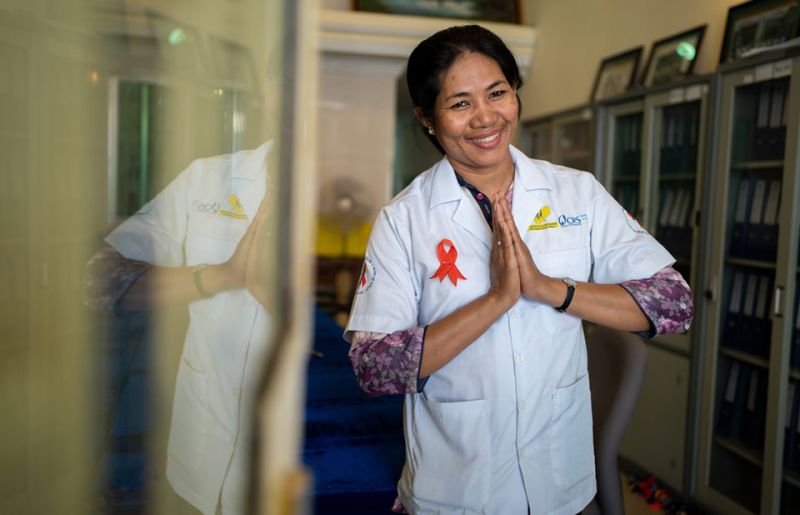GENEVA, 19 May 2022— Ahead of the World Economic Forum’s annual meeting in Davos, Switzerland, the Executive Director of UNAIDS, Winnie Byanyima, has issued an urgent warning that economic recovery and health security plans that do not tackle inequality face catastrophic failure.
Ms Byanyima brings a message from communities on the frontline that rules which exacerbate inequalities are jeopardising recovery, prolonging the AIDS and COVID pandemics, undermining public health, and endangering everyone. Ms Byanyima is calling on leaders to replace intellectual property rules which restrict access to life-saving medicines for HIV, COVID-19 and other pandemics for people in the Global South with ones that require technology sharing; and to replace debt repayment rules which force low- and middle-income countries to slash spending on education and health, hampering vital HIV prevention and treatment programmes, with ones that expand investments in times of crisis.
Today’s unjust global rules have hit Africans hardest, and have also widened the gender inequality gap. Ms Byanyima is calling out their “racist and sexist effects”. During 2020, women were 1.4 times more likely to drop out of the labour force. Every week, 4,200 adolescent girls and young women in sub-Saharan Africa acquire HIV. A year and half since the first doses of a COVID vaccine was delivered, 75% of people in high income countries are fully vaccinated, but under 13% of people in lower income countries are.
“When COVID-19 hit, Africans were told to stand at the back of the queue while rich countries protected themselves with PPE, vaccines and treatment, told that pharmaceutical companies wouldn’t share their technologies because the vaccine was too ‘complicated’ for us to make,” said Ms Byanyima.
Ms Byanyima’s comments came following a visit to Afrigen, a South African company, where scientists have developed a new COVID-19 vaccine using available information to create a vaccine similar to the Moderna vaccine which they plan to distribute at an affordable price across the continent: “I saw state of the art facilities, young scientists and passionate leaders building not just vaccines for COVID but also other diseases, other treatments to make Africa prepared so that we never again have to stand at the back of the queue,” said Ms Byanyima. Yet in spite of the huge profits made, western pharmaceutical companies continue to refuse to share their recipes and technologies for public good. In 2021, Pfizer, BioNTech and Moderna were estimated to have made pre-tax profits of $34 billion.
UNAIDS is warning that this pattern of exclusion looks set to be repeated in access to new “long acting” HIV medicines coming on stream. This new set of breakthrough HIV medicines (available for prevention now and set to be available for treatment in the near term) are taken every few months instead of every day, and could, if they are made available at scale as they are rolled out, help save many lives and help end the AIDS pandemic. But high prices and monopolies are set to keep many people in low- and middle-income countries locked out.
There is an urgent need to reform rules on the protection of intellectual property that have failed the world in these pandemics, so that access to life-saving science is no longer dependent on the passport people hold or the money in their pocket. It is possible to end the AIDS pandemic, beat COVID-19, and stop the pandemics of the future, if biomedical breakthroughs get to all those who need them most. If leaders act on access to long-acting ARVs, many people who would otherwise have acquired HIV will not, people living with HIV who would otherwise have died of AIDS will not, and the well-being and dignity of people at risk of or living with HIV can be enhanced.
Every minute a life is lost to AIDS. 1.5 million people were newly infected with HIV in 2020. People living with HIV who are active in the fight for equal access to medicines, for debt cancellation, and for health for all, insist that human rights are central to effective pandemic response and public health.
Exclusionary policies hurt everyone, Ms Byanyima is warning: “When people in low- and middle- income countries are excluded from life-saving health technologies for HIV, COVID-19 or other pandemics, let’s be clear that this also causes deaths in rich countries, perpetuates pandemics, and undermines the global economy.”
A successful economic recovery must be inclusive. Debt servicing for all the world’s poorest countries debt represented 171% of all spending on healthcare, education and social protection combined for low-income countries in 2021. Health, education and social protection needs require an urgent cancellation of debts. There is a need too for massive new IMF special drawing rights (SDRs) allocation dedicated to low- and middle-income countries, and a reallocation of resources from the 2021 SDR allocation.
Through debt cancellation and a shift of IMF SDRs, low- and middle- income countries could upscale the investments in health and education that build more equal societies and stop pandemics like AIDS and COVID-19. Through new rules requiring pharmaceutical companies to share the rights and recipes for life-saving, pandemic-ending, medicines, it will be possible to protect the health of everyone. The steps needed to end AIDS and beat COVID-19 provide the pathway to pandemic preparedness. “The only realistic strategy for economic recovery, health security and pandemic preparedness is to be bold in fighting inequality,” says Ms Byanyima.
UNAIDS
The Joint United Nations Programme on HIV/AIDS (UNAIDS) leads and inspires the world to achieve its shared vision of zero new HIV infections, zero discrimination and zero AIDS-related deaths. UNAIDS unites the efforts of 11 UN organizations—UNHCR, UNICEF, WFP, UNDP, UNFPA, UNODC, UN Women, ILO, UNESCO, WHO and the World Bank—and works closely with global and national partners towards ending the AIDS epidemic by 2030 as part of the Sustainable Development Goals. Learn more at unaids.org and connect with us on Facebook, Twitter, Instagram and YouTube.




